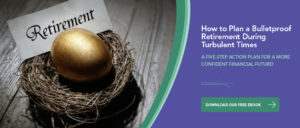Getting Defensive Against a Recession
Affluence can make it easy to believe that you are immune to economic downturns. After all, it typically involves having substantial assets, investments, and resources at your disposal. History has shown us time and again, however, that even the wealthiest individuals can be impacted by financial crises. That is why it’s essential to prepare for a 2023 recession: You need a solid plan in place to protect your savings and assets.
In the sections below, I discuss the unique challenges faced by the affluent during a recession and key steps to take for fortifying your wealth. There are potential strategies for leveraging market opportunities during a downturn, as well. This blog is meant to encourage you, prepare you for weathering the storm, and help you come out on top.
These topics are discussed in this article:
- It’s no longer a question of “if:” It’s probably a matter of “when”
- The best protective measures are ongoing & long-term
- Comprehensive business & personal financial planning benefits
- Paul Schatz, an Accredited Investment Fiduciary®, can help
It’s No Longer a Question of “If:” It’s Probably a Matter of “When”
You may not feel defensive, but the world of finance is unpredictable and volatile, and one of the most significant challenges investors face is a potential economic recession. Some economists laughed at the idea of one in 2022, but no one finds it very funny now. Again, while it’s impossible to predict exactly when a recession will occur, affluent investors need to prepare for the possibility as soon as possible.
If you’re wondering why, there are multiple reasons. The foremost is probably for the purpose of preemptively managing your risk. As an affluent investor, by definition, you have a significant amount of wealth invested in the financial markets. Recessions often cause the value of some investments to drop significantly. This happens, in some cases, as those companies go bankrupt or face a battle for survival.
As a result, there may be significant losses in the stock market—and your portfolio, if you haven’t taken proactive measures beforehand. That could even impact your net worth, potentially diminishing, for example, your high-net-worth retirement savings. Even in the best of economic circumstances, it can be difficult to make up for losses like these.
Is Your Financial Advisor Ghosting You? We Discuss Ways To Determine if They’re Underwhelming, Here.
The Best Protective Measures Are Ongoing & Long-Term
Under most circumstances, you’re better off fortifying your assets to help keep losses from happening in the first place. That’s why we should be working to preserve your capital now, not once the dam has broken and Wall Street is submerged.
- Diversify your portfolio. This strategy, especially, helps reduce investment risk. We can diversify your portfolio by investing in a variety of strategies and asset types, such as stocks, bonds, and alternative investments, such as real estate or commodities. Keeping your assets balanced for the economic weather should be like maintenance on a car: Just as your antifreeze should be thinned for summer’s heat, your holdings should be readied ahead of each economic season.
- Reduce any debt. During a recession, income streams may decrease, making it suddenly challenging to pay off debt. If you have any loans, it’s a good idea to reduce them (if not pay them off completely) before the downturn. This can also help free up cash flow, which can be used to cover essential or unexpected expenses.
- Increase your cash reserves. Cash reserves can be critical during a recession since they can provide a financial safety net during uncertain times. Again, they can help cover surprise expenses during the downturn. They can also fund investments in quality assets while the market is low.
If investing during a recession seems counter-intuitive, the idea isn’t to spend like a drunken sailor. Instead, savvy investors keep an eye out for the chance to buy high-quality assets at unusually discounted prices.
Imagine purchasing shares of the next Apple at a fraction of their normal going rate. Next, imagine watching that stock rise again once the economy improves. This strategy has the potential to generate significant returns later once the market recovers.
Comprehensive Business & Personal Financial Planning Benefits
 If you don’t already have one, please don’t put off establishing a comprehensive business and personal financial plan. As the economy continues to fluctuate, it’s increasingly crucial to your pre-recession preparation. It should help to protect your wealth, but for the reasons I’ve described above, it can also facilitate a sort of financial cushion.
If you don’t already have one, please don’t put off establishing a comprehensive business and personal financial plan. As the economy continues to fluctuate, it’s increasingly crucial to your pre-recession preparation. It should help to protect your wealth, but for the reasons I’ve described above, it can also facilitate a sort of financial cushion.
These aren’t the only reasons why, however: During a recession, taxes can become an even more significant financial burden. Comprehensive financial planning, thankfully, can help you mitigate tax liabilities. Similarly, estate planning can help you anticipate potential trouble spots by assisting with ensuring that your financial legacy isn’t overtaxed.
There’s a lot to be said for comprehensive business planning, as well. As I mentioned earlier, companies may struggle to stay afloat if a recession causes their revenues to drop significantly. Having a solid business plan in place can help you prepare for lean times, adjust your strategies, and make informed decisions to safeguard your endeavors.
Paul Schatz, an Accredited Investment Fiduciary®, Can Help
My bottom line here is that you are not alone. Heritage Capital has seen many economic seasons, including downturns. Additionally, we are an independent fiduciary wealth management firm. This means that our team is accountable to the State of CT and SEC.
We also take pride in keeping as transparent as possible with our clients. By definition, a fiduciary is sworn to put our clients’ financial interests ahead of our own and avoid conflicts of interest. Even if doing so were to cost us money from our own pockets, we won’t hesitate.
In the simplest terms, you might say that fiduciaries treat your savings and assets with the same care and concern that we have for our own. As an individual, I am also an Accredited Investment Fiduciary® (AIF®). My specialty is working with high-net-worth individuals and families.
I’m always here to help you retire with confidence in Woodbridge or wherever you live, but my team and I are ready to assist you with fortifying your savings and assets against the recession, as well. Contact us or schedule a complimentary consultation to learn more.


